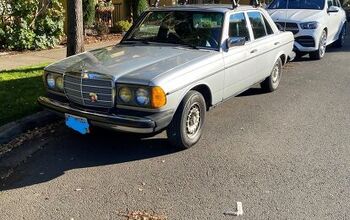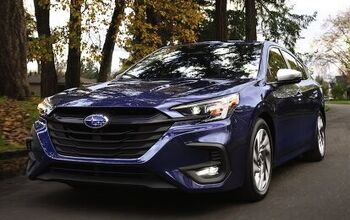Lexus No. 1 in Reliability, Ford Near Bottom
If reliability is the No. 1 trait your next car must have, you may then opt to visit your nearest Lexus dealership before considering anything from the Ford dealership across the street as far as Consumer Reports is concerned.
Lexus, Toyota and Acura dominate the consumer magazine’s Top 10 in reliability for 2013, with a total of seven Japanese automakers taking almost all of the marbles; the only non-Japanese makes to make the Top 10 were Audi (No. 4), Volvo (No. 7) and GMC (No. 9).
Meanwhile, Ford was pushed into the No. 26 slot after being stranded in the 27th position last year. Lincoln fell back to No. 27 on reliability, with BMW’s MINI in dead last on the side of the road. Reasons for both Ford and Lincoln being where they are include complaints about the automaker’s MyFordTouch system, and problems with their EcoBoost engine.
If you’re at the Toyota dealership, however, Consumer Reports recommends anything but the Camry, Prius v or RAV4. The magazine retracted its recommendations for the trio due to poor results in crash testing as conducted by the Insurance Institute for Highway Safety, a decision the publication doesn’t take lightly according to Consumer Reports Director of Auto Testing Jake Fisher:
Honestly, we don’t take this lightly, but virtually every vehicle now in the family sedan category has been tested and the only one that has gotten a ‘poor’ is the Camry. At this point, we don’t feel we can continue to recommend people buy a Camry when there’s other good choices out there that do better on the test.
That said, there may be hope for redemption regarding the Camry: Toyota’s engineers have gone over the car’s failings, and will retest with IIHS in December.
Fisher also said that with 50 vehicles tested by the IIHS, his publication has enough data to begin weeding out any vehicle with a “poor” rating. Thus, expect to see more recommendations retracted on some cars the next time you head to the newsstand to pick up the latest issue of Consumer Reports.
Photo credit: Lexus
Seattle-based writer, blogger, and photographer for many a publication. Born in Louisville. Raised in Kansas. Where I lay my head is home.
More by Cameron Aubernon
Latest Car Reviews
Read moreLatest Product Reviews
Read moreRecent Comments
- Redapple2 Love the wheels
- Redapple2 Good luck to them. They used to make great cars. 510. 240Z, Sentra SE-R. Maxima. Frontier.
- Joe65688619 Under Ghosn they went through the same short-term bottom-line thinking that GM did in the 80s/90s, and they have not recovered say, to their heyday in the 50s and 60s in terms of market share and innovation. Poor design decisions (a CVT in their front-wheel drive "4-Door Sports Car", model overlap in a poorly performing segment (they never needed the Altima AND the Maxima...what they needed was one vehicle with different drivetrain, including hybrid, to compete with the Accord/Camry, and decontenting their vehicles: My 2012 QX56 (I know, not a Nissan, but the same holds for the Armada) had power rear windows in the cargo area that could vent, a glass hatch on the back door that could be opened separate from the whole liftgate (in such a tall vehicle, kinda essential if you have it in a garage and want to load the trunk without having to open the garage door to make room for the lift gate), a nice driver's side folding armrest, and a few other quality-of-life details absent from my 2018 QX80. In a competitive market this attention to detai is can be the differentiator that sell cars. Now they are caught in the middle of the market, competing more with Hyundai and Kia and selling discounted vehicles near the same price points, but losing money on them. They invested also invested a lot in niche platforms. The Leaf was one of the first full EVs, but never really evolved. They misjudged the market - luxury EVs are selling, small budget models not so much. Variable compression engines offering little in terms of real-world power or tech, let a lot of complexity that is leading to higher failure rates. Aside from the Z and GT-R (low volume models), not much forced induction (whether your a fan or not, look at what Honda did with the CR-V and Acura RDX - same chassis, slap a turbo on it, make it nicer inside, and now you can sell it as a semi-premium brand with higher markup). That said, I do believe they retain the technical and engineering capability to do far better. About time management realized they need to make smarter investments and understand their markets better.
- Kwik_Shift_Pro4X Off-road fluff on vehicles that should not be off road needs to die.
- Kwik_Shift_Pro4X Saw this posted on social media; “Just bought a 2023 Tundra with the 14" screen. Let my son borrow it for the afternoon, he connected his phone to listen to his iTunes.The next day my insurance company raised my rates and added my son to my policy. The email said that a private company showed that my son drove the vehicle. He already had his own vehicle that he was insuring.My insurance company demanded he give all his insurance info and some private info for proof. He declined for privacy reasons and my insurance cancelled my policy.These new vehicles with their tech are on condition that we give up our privacy to enter their world. It's not worth it people.”


































Comments
Join the conversation
When one looks at JD Power, they list problems as per 100 units. Statistically 130 problems per 100 isn't all that much different than 140 problems per 100 but a shop rate of 110 dollars an hour makes a few extra repairs significant unless you happen to be Jay Leno.
Why do people on this thread compare Lexus to Ford? If you're to make a valid comparison then do so correctly.